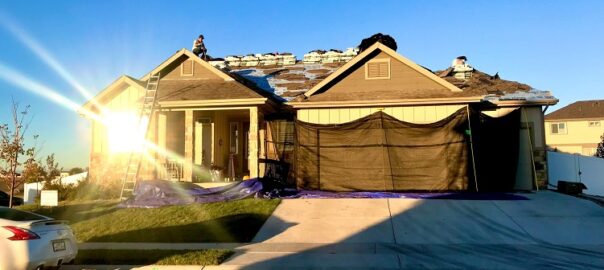When it comes to protecting your home from the large hailstones that are common on the Front Range of Colorado, the type of roof you have can make a big difference. In this article, we will discuss the top types of roofing materials that are ideal for resisting hail damage, as well as the advantages, and cost comparison of each roof type.
Metal roofing: Metal roofing is one of the most durable roofing options available and is resistant to most hail damage depending on the thickness of the metal. It’s also good for heavy snowfall areas too. Metal roofing is available in a variety of styles and colors and can last for decades with proper maintenance and the appropriate underlayment. Additionally, metal roofing is fire-resistant and also energy-efficient, which can lower your cooling and heating costs. They tend to be more expensive than other options, but can last for 30-50 years and can increase a home’s value when you go to sell. It’s very popular along the Front Range and in the Mountains.
Concrete and Clay Tile Roofing: Concrete and clay tile roofing are also highly resistant to hail damage and can last upwards of 50 years with proper maintenance. Some clay tile roofs in Europe have last 100’s of years. They are fire-resistant, energy-efficient, and offer a high level of durability and weather resistance. These are also more expensive than traditional asphalt shingles but can last a lot longer, look great and increase home value. NOTE: As durable as concrete tiles are to weather, a number of Insurance Companies do not recognize a lot of different Tile manufacturers for a Class 4 – Impact Resistant premium discount. Check with your agent to see if your manufacturer is on the list.
Composite/Fiberglass shingles: There are a number of new Composite options for a roofing material that are coming onto the market every year. We are not early adopters of them because we feel like they need to be battle-tested with our weather on the Front Range. Fiberglass shingles are a more affordable option than a Metal Roof or even a Tile Roof. There are a number of different types. They are also resistant to hail damage and lighter material and can last for up to 20+ years with proper maintenance. They are also fire-resistant. They come in a variety of colors and styles, but they may not last as long as the other options. And because they are thinner and lighter than are not really great in colder climates because they provide a little less insulation and can crack in the colder temperatures.
Architectural Asphalt Shingles: Class 4 – Impact-resistant shingles: Impact-resistant shingles are a popular choice for homes in the Front Range area, as they are specially designed to resist hail damage. These shingles are constructed from a combination of asphalt and a rubber polymer and are rated to withstand hailstones of up to 2 inches in diameter. These shingles are more affordable than Metal or Concrete Tile roofs. And a little more than a traditional Asphalt Shingle. When installed correctly they can last up to 20 or 25 years with proper maintenance. They come in many colors, are Fire Resistant, and are an upgrade to a traditional shingle. A Class 4 IR Shingle can also get you up to a 25% Discount on your Homeowners Insurance with some carriers. We at Denny’s Roofing like it so much that we put a Class 4 IR Shingle on almost every new roof we put on. The cost vs value of this product is spectacular. Ask us more when we come out to take a look at your roof.
In conclusion, when it comes to resisting hail damage in the Front Range area of Colorado, metal, concrete, and clay tile, composite shingle, fiberglass shingles, and asphalt class-4 impact-resistant shingles are among the best options. Each of these roofing types has its own advantages and cost considerations. While metal, concrete, and clay tile roofing may be more expensive, they have a longer lifespan and can increase the value of your home. Impact-resistant shingles may be more affordable and still offers good resistance to hail damage. Ultimately, the best option for your home will depend on your specific needs, budget, and preferences. It is always recommended to speak with a professional roofing contractor to find out what is the best choice for your home. Give us a call to discuss the options!

